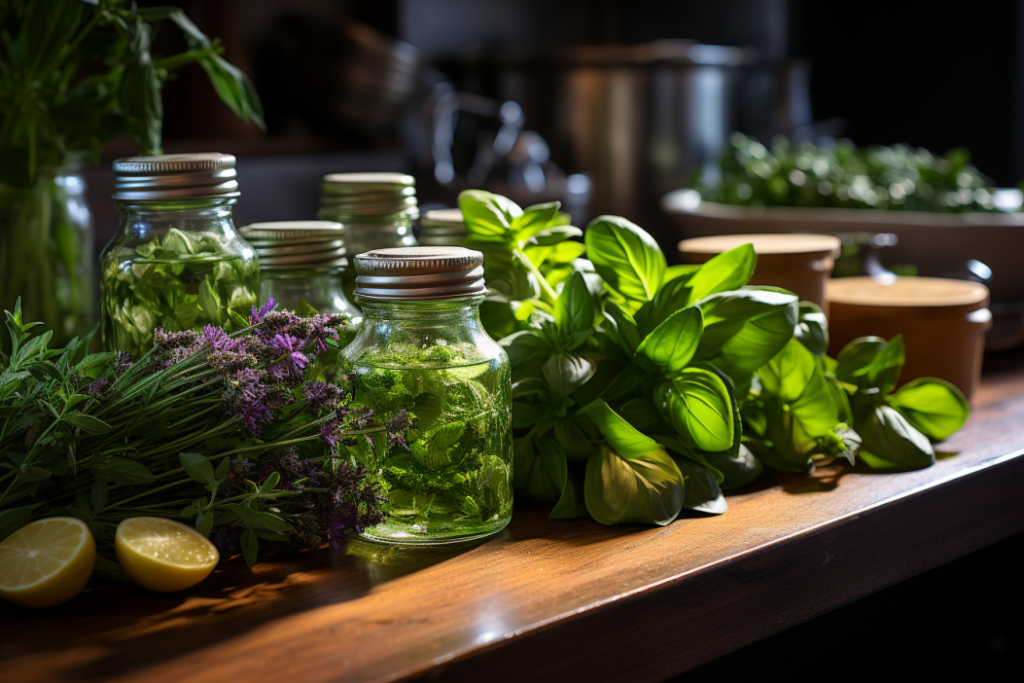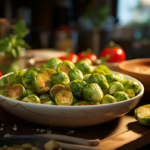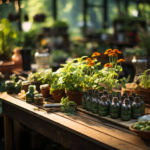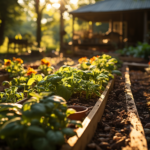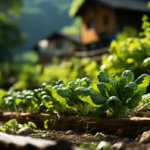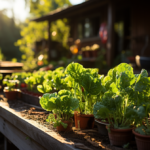Table of Contents
Discover the Best Herbs to Grow in Your Backyard and Enjoy Fresh and Fragrant Flavors All Year Round
Are you looking to amp up your cooking game and add some fresh flavors to your meals? Growing your own herbs is not only a cost-effective way of getting your hands on fresh herbs, but it’s also a great way to add a touch of greenery to your home. Plus, what could be more gratifying than using herbs that you’ve grown yourself? Even if you don’t have much space, herbs are versatile and can be grown in pots on a small balcony or windowsill. Whether you’re making a hearty pasta sauce or a refreshing summer salad, having your own herb garden will give your dishes that extra zing and make you feel like a master chef in no time!
Benefits of Growing Your Own Herbs
When it comes to gardening, there are so many benefits to growing your own herbs. Not only are they a cost-effective and convenient way to add fresh flavors to your meals, but they’re also an excellent way to connect with nature and enjoy the satisfaction of growing your own produce. Here are some of the top benefits of growing your own herbs:
Convenience and Cost-Effective
One of the biggest benefits of growing your own herbs is convenience. With your own herb garden, you’ll never have to worry about running out of fresh herbs or making a last-minute trip to the grocery store. Plus, growing your own herbs is a cost-effective way to enjoy fresh produce year-round.
Enhance the Flavor of Your Dishes
Another significant benefit of growing your own herbs is the ability to enhance the flavor of your dishes. Adding fresh herbs to your meals can take your culinary creations to the next level, giving them an extra pop of flavor that store-bought herbs just can’t offer. From basil to thyme, rosemary to chives, there are countless herbs you can grow to add a unique and delicious flavor to your dishes.
Health Benefits
Many herbs offer health benefits too, making them an even more significant asset to your garden. From peppermint and ginger to sage and oregano, herbs have been used for centuries for their medicinal properties. Plus, growing your own herbs means you can rest assured that they’re free from pesticides and chemicals.
Environmental Impact
Finally, growing your own herbs has a positive environmental impact. It reduces the carbon footprint associated with transporting herbs from the farm to the store, and also reduces the use of harmful chemicals in commercial farming. By growing your own herbs, you’ll be contributing to a more sustainable and environmentally-friendly future.
Growing your own herbs is an excellent way to spruce up your meals, connect with nature, and enjoy a sustainable and cost-effective source of fresh produce. Whether you’re a seasoned gardener or brand new to the world of gardening, growing herbs is an easy and enjoyable way to add some greenery to your home.
The Most Common Herbs You Can Grow at Home
If you’re new to growing herbs, there are some basic and common herbs that are easy to grow and maintain. Here are some of the most common herbs you can grow at home.
- Basil – This herb is the quintessential ingredient for Italian cuisine and is particularly sweet and aromatic.
- Mint – With its fresh and invigorating scent, mint is the perfect herb for flavoring teas, lemonades, or mojitos.
- Parsley – This mild-tasting herb is a staple in Middle Eastern and Mediterranean dishes and is great for garnishes.
- Chives – These herbs are a close relative to onions and are often used as a substitute for them.
- Thyme – This herb is frequently used in soups, stews, and even bread recipes.
- Rosemary – This hearty herb has hints of lemon and pine and is a perfect addition to lamb, chicken, and potatoes.
- Sage – This savory herb is crucial in stuffing, and it adds a unique flavor to bean dishes and teas.
Benefits of Growing Your Own Herbs
When you grow your herbs, you control their growth and cultivation, which makes them healthier and more nutritious. Here are the benefits of growing your own herbs:
- Cost-Effective – Buying herbs from the grocery store can be an expensive habit, especially if you want fresh herbs. Growing your herbs reduces this cost, and you can save money by picking only what you need.
- Health Benefits – Herbs have many health benefits, and growing your own herbs ensures that they are free of harmful chemicals and pesticides.
- Convenience – Having your little herb garden means that you can have fresh herbs whenever you need them. No more trips to the store for just one ingredient!
- Pleasure – Gardening can be a relaxing and enjoyable hobby, and growing your herbs is not only cost-effective but brings pleasure to your daily life, too.
Growing your herbs is a simple and cost-effective way to add flavor and nutrition to your meals. With the above common herbs, and their health benefits, you’re sure to make the most of your homegrown herbs in any dish you choose to make.
Tips for Caring for Your Herb Garden
Growing herbs is a low-maintenance way of cultivating fresh ingredients for your cooking. However, even though herbs are easy to grow, they still require care and attention to thrive. Here are some tips to keep your herb garden healthy and vibrant.
Watering
Most herbs prefer well-draining soil that’s evenly moist. You don’t want to over-water your herbs, so make sure the soil is moist but not waterlogged. A good rule of thumb is to water your herbs when the top inch of soil feels dry to the touch. Be careful not to water the leaves, as this can promote fungal growth.
Sunlight
Herbs generally prefer at least six hours of direct sunlight a day. Make sure to plant your herbs in a spot that gets plenty of sun, and try to provide shade during the hottest parts of the day. If you’re growing herbs indoors, ensure that they’re placed near a sunny window or under artificial grow lights.
Soil
The soil is the foundation of your herb garden. Herbs generally prefer well-draining soil that’s rich in organic matter. You can buy soil specifically formulated for herbs, or you can make your own by mixing compost, garden soil, and sand.
Fertilizer
Herbs don’t require a lot of fertilizer, but a small amount can help them grow stronger and produce more flavorful leaves. You can use a balanced fertilizer once a month during the growing season to keep your herbs healthy.
Pruning
Herbs can become leggy if they’re not pruned regularly. Pruning your herbs will not only keep them looking tidy but also prevent them from getting overcrowded and potentially diseased. Pinch off the tips of the stems regularly to promote bushier growth and prevent flowers from forming.
By following these simple tips, you can grow a healthy and productive herb garden. Remember to check on your herbs regularly and adjust your care routine as needed to keep them thriving. With a little effort and attention, you’ll be able to enjoy fresh and flavorful herbs right from your own backyard.
Creative Ways to Use Fresh Herbs in Your Cooking
Growing your own herbs isn’t just about having an abundance of fresh, fragrant flavors at your fingertips; it also gives you the opportunity to experiment with creative ways to use them in your cooking. Here are some ideas to inspire you:
Basil goes with everything: This herb is a staple in Italian cooking and a perfect complement to tomatoes and mozzarella. However, don’t JUST limit basil to Italian dishes. Basil also pairs well with strawberries, peaches, and even watermelon in fruit salads and desserts.
Mint is a refreshing flavor: Mint is perfect for desserts, like adding to your fruit salad, and super-refreshing drinks, like adding it to sparkling water with some lemon. It is also a crucial ingredient in preparing healthy smoothies.
Rosemary is excellent with meats: Rosemary is one of the most aromatic herbs. It goes beautifully with chicken, pork, and lamb, adding a woody, piney flavor. Also, try infusing olive oil with rosemary to use as a dipping sauce with bread.
Sage is perfect for stuffing: Sage is a classic herb often used during the Thanksgiving holiday, usually mixed with stuffing but can also add depth of flavor to your homemade pasta and sausages.
Thyme is great for marinades: One of the most impressive things about thyme is that it will work so well in marinades for all kinds of meats. It is especially good in marinades for roasted chicken, helping to produce the crispiest skin!
Experiment and have fun: Finally, there’s nothing stopping you from getting creative with your herbs – try making herb-infused salts, herb-infused vinegar, and even herb-infused cocktails.
Growing herbs in your garden not only provides fantastic flavors to your dishes, refreshing scents, and lovely greenery but also encourages creativity in your cooking. Be bold and sprinkle some freshly-picked basil on your fruit salad or infuse your olive oil with Rosemary and let your taste buds take you on a culinary journey! Experimenting with your recipes using fresh herbs will undoubtedly make your meals exciting and delicious.
Conclusion
In conclusion, growing your own herb garden is a wonderful way to enhance your cooking, improve your health, and gain a newfound appreciation for the fresh flavors and scents that herbs can bring. With just a little bit of effort and some TLC, you can have a bountiful supply of fresh herbs right at your fingertips. Whether you’re a seasoned gardener or a novice, there’s always something new to learn and try when it comes to growing your own herbs. So what are you waiting for? Get your hands dirty, and start planting today!

